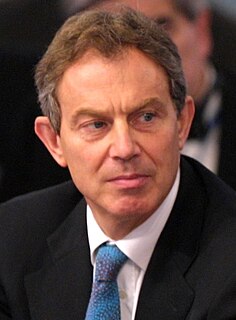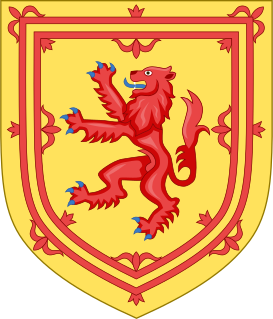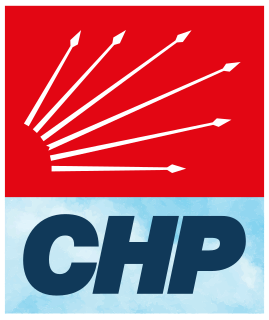Related Research Articles

The 1997 United Kingdom general election was held on 1 May 1997. The governing Conservative Party led by Prime Minister John Major was defeated in a landslide by the Labour Party led by Tony Blair, achieving a 179 seat majority.
In political science, a multi-party system is a political system in which multiple political parties across the political spectrum run for national elections, and all have the capacity to gain control of government offices, separately or in coalition. Apart from one-party-dominant and two-party systems, multi-party systems tend to be more common in parliamentary systems than presidential systems and far more common in countries that use proportional representation compared to countries that use first-past-the-post elections. Several parties compete for power and all of them have reasonable chance of forming government.

The 2000 Canadian federal election was held on November 27, 2000, to elect members to the House of Commons of Canada of the 37th Parliament of Canada. Prime Minister Jean Chrétien's Liberal Party won a third majority government.

In a first-past-the-post electoral system, voters cast their vote for a candidate of their choice, and the candidate who receives the most votes wins. FPTP is a plurality voting method, and is primarily used in systems that use single-member electoral divisions. FPTP is used as the primary form of allocating seats for legislative elections in about a third of the world's countries, mostly in the English-speaking world. The phrase is a metaphor from British horse racing, where there is a post at the finish line.

The politics of Scotland operate within the constitution of the United Kingdom, of which Scotland is a home nation. Scotland is a democracy, being represented in both the Scottish Parliament and the Parliament of the United Kingdom since the Scotland Act 1998. Most executive power is exercised by the Scottish Government, led by the First Minister of Scotland, the head of government in a multi-party system. The judiciary of Scotland, dealing with Scots law, is independent of the legislature and the executive. Scots law is primarily determined by the Scottish Parliament. The Scottish Government shares some executive powers with the Government of the United Kingdom's Scotland Office, a British government department led by the Secretary of State for Scotland.

The 1997 Canadian federal election was held on June 2, 1997, to elect members to the House of Commons of the 36th Parliament of Canada. Prime Minister Jean Chrétien's Liberal Party won a second majority government. The Reform Party replaced the Bloc Québécois as the Official Opposition.

The Irish general election of 1918 was the part of the 1918 United Kingdom general election which took place in Ireland. It is now seen as a key moment in modern Irish history because it saw the overwhelming defeat of the moderate nationalist Irish Parliamentary Party (IPP), which had dominated the Irish political landscape since the 1880s, and a landslide victory for the radical Sinn Féin party. Sinn Féin had never stood in a general election, but had won six seats in by-elections in 1917–18. The party had vowed in its manifesto to establish an independent Irish Republic. In Ulster, however, the Unionist Party was the most successful party.

The 1945 United Kingdom general election was a national election held on 5 July 1945, but polling in some constituencies was delayed by some days, and the counting of votes was delayed until 26 July to provide time for overseas votes to be brought to Britain. The governing Conservative Party sought to maintain its position in Parliament but faced challenges from public opinion about the future of the United Kingdom in the post-war period. British Prime Minister Winston Churchill proposed to call for a general election in Parliament, which passed with a majority vote less than two months after the conclusion of the Second World War in Europe.

The 1921 Canadian federal election was held on December 6, 1921, to elect members of the House of Commons of Canada of the 14th Parliament of Canada. The Union government that had governed Canada through the First World War was defeated, and replaced by a Liberal government under the young leader William Lyon Mackenzie King. A new third party, the Progressive Party, won the second most seats in the election.

The 1964 United Kingdom general election was held on 15 October 1964, five years after the previous election, and thirteen years after the Conservative Party, first led by Winston Churchill, had regained power. It resulted in the Conservatives, led by the incumbent Prime Minister Alec Douglas-Home, narrowly losing to the Labour Party, led by Harold Wilson; Labour secured a parliamentary majority of four seats and ended its thirteen years in opposition. Wilson became the youngest Prime Minister since Lord Rosebery in 1894.

The Politics of Alberta are centred on a provincial government resembling that of the other Canadian provinces, namely a constitutional monarchy and parliamentary democracy. The capital of the province is Edmonton, where the provincial Legislative Building is located.

The Republican People's Party is a Kemalist and social-democratic political party in Turkey which currently stands as the main opposition party. It is also the oldest political party in Turkey, founded by Mustafa Kemal Atatürk, the first president and founder of the modern Turkish Republic. The party is also cited as the founding party of modern Turkey. The CHP describes itself as a ''modern social-democratic party, which is faithful to the founding principles and values of the Republic of Turkey". Its logo consists of the Six Arrows, which represent the foundational principles of Kemalism: republicanism, reformism, laicism (Laïcité/Secularism), populism, nationalism, and statism. It is the main opposition party to the ruling conservative Justice and Development Party (AKP) in the Grand National Assembly with 135 MPs.

The United Democratic Party (UDP) is one of the two major political parties in Belize. It is currently the main opposition party, having lost the 2020 Belizean general election, after previously holding the government across three prior terms. Founded as a centre-right conservative party, the UDP is led by Shyne Barrow.
Indian National Lok Dal (INLD) is a political party in India, in the state of Haryana. INLD was founded in October 1996 as Haryana Lok Dal (Rashtriya) by Choudhary Devi Lal, who served as Deputy Prime Minister of India in the V.P. Singh's Cabinet and Chief Minister of Haryana twice. His son Om Prakash Chautala is the President. Former Leader of Opposition, Abhay Singh Chautala is Secretary General of INLD.

Bath is a constituency in the House of Commons of the Parliament of the United Kingdom represented by Wera Hobhouse of the Liberal Democrats.
A bellwether is a leader or an indicator of trends.

Wavel Ramkalawan is a Seychellois politician and Anglican priest who has been serving as the president of Seychelles since 26 October 2020. Ramkalawan was an opposition MP from 1993 to 2011 and 2016 to 2020. He also served as the Leader of the Opposition from 1998 to 2011 and 2016 to 2020. On 25 October 2020, Ramkalawan won the presidential election, the country's first such victory for an opposition candidate since independence, marking its first successful peaceful transition of power.
The 1958 Torrington by-election, in Devon, England, was the first gain by the British Liberal Party at a by-election since Holland with Boston in 1929.
Welsh Labour is the branch of the United Kingdom Labour Party in Wales and the largest party in modern Welsh politics. Welsh Labour and its forebears won a plurality of the Welsh vote at every UK general election since 1922, Senedd election since 1999, and European Parliament election in 1979–2004 and 2014. Welsh Labour holds 22 of the 40 Welsh seats in the UK Parliament, 30 of the 60 seats in the Welsh Senedd and 576 of the 1,264 councillors in principal local authorities, including overall control of 10 of the 22 principal local authorities.
A landslide victory is an election result in which the victorious candidate or party wins by an overwhelming margin. The term became popular in the 1800s to describe a victory in which the opposition is "buried", similar to the way in which a geological landslide buries whatever is in its path. What constitutes a landslide varies by the type of electoral system. Even within an electoral system, there is no consensus on what sized margin makes for a landslide.
References
- Tim Bullamore, Obituary: Gilbert Young, The Independent , July 10, 1998
- Anecdote - Gilbert Young